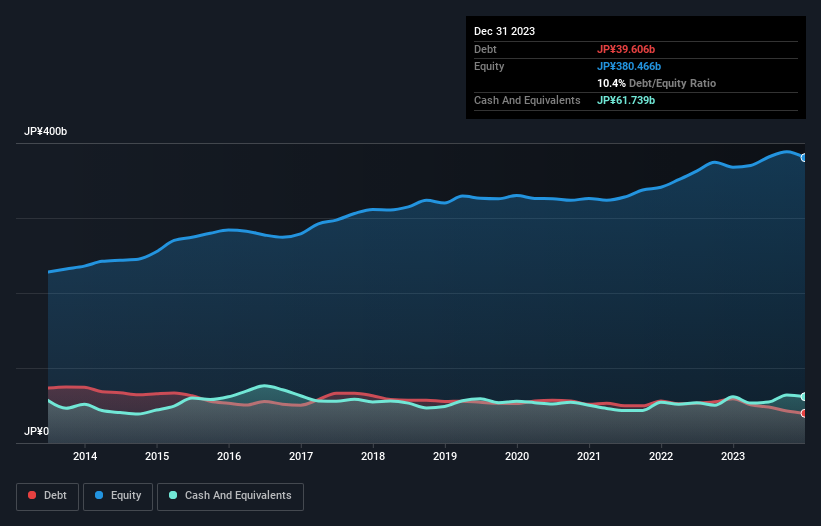Here's Why Nippon Shokubai (TSE:4114) Can Manage Its Debt Responsibly
The external fund manager backed by Berkshire Hathaway's Charlie Munger, Li Lu, makes no bones about it when he says 'The biggest investment risk is not the volatility of prices, but whether you will suffer a permanent loss of capital.' So it seems the smart money knows that debt - which is usually involved in bankruptcies - is a very important factor, when you assess how risky a company is. As with many other companies Nippon Shokubai Co., Ltd. (TSE:4114) makes use of debt. But is this debt a concern to shareholders?
What Risk Does Debt Bring?
Debt assists a business until the business has trouble paying it off, either with new capital or with free cash flow. If things get really bad, the lenders can take control of the business. However, a more frequent (but still costly) occurrence is where a company must issue shares at bargain-basement prices, permanently diluting shareholders, just to shore up its balance sheet. Of course, plenty of companies use debt to fund growth, without any negative consequences. When we examine debt levels, we first consider both cash and debt levels, together.
View our latest analysis for Nippon Shokubai
How Much Debt Does Nippon Shokubai Carry?
You can click the graphic below for the historical numbers, but it shows that Nippon Shokubai had JP¥39.6b of debt in December 2023, down from JP¥59.0b, one year before. But on the other hand it also has JP¥61.7b in cash, leading to a JP¥22.1b net cash position.

How Healthy Is Nippon Shokubai's Balance Sheet?
The latest balance sheet data shows that Nippon Shokubai had liabilities of JP¥98.6b due within a year, and liabilities of JP¥50.2b falling due after that. Offsetting these obligations, it had cash of JP¥61.7b as well as receivables valued at JP¥97.1b due within 12 months. So it can boast JP¥10.0b more liquid assets than total liabilities.
This surplus suggests that Nippon Shokubai has a conservative balance sheet, and could probably eliminate its debt without much difficulty. Simply put, the fact that Nippon Shokubai has more cash than debt is arguably a good indication that it can manage its debt safely.
The modesty of its debt load may become crucial for Nippon Shokubai if management cannot prevent a repeat of the 58% cut to EBIT over the last year. When a company sees its earnings tank, it can sometimes find its relationships with its lenders turn sour. When analysing debt levels, the balance sheet is the obvious place to start. But it is future earnings, more than anything, that will determine Nippon Shokubai's ability to maintain a healthy balance sheet going forward. So if you're focused on the future you can check out this free report showing analyst profit forecasts.
Finally, while the tax-man may adore accounting profits, lenders only accept cold hard cash. While Nippon Shokubai has net cash on its balance sheet, it's still worth taking a look at its ability to convert earnings before interest and tax (EBIT) to free cash flow, to help us understand how quickly it is building (or eroding) that cash balance. Over the last three years, Nippon Shokubai recorded free cash flow worth a fulsome 83% of its EBIT, which is stronger than we'd usually expect. That puts it in a very strong position to pay down debt.
Summing Up
While it is always sensible to investigate a company's debt, in this case Nippon Shokubai has JP¥22.1b in net cash and a decent-looking balance sheet. The cherry on top was that in converted 83% of that EBIT to free cash flow, bringing in JP¥34b. So we are not troubled with Nippon Shokubai's debt use. The balance sheet is clearly the area to focus on when you are analysing debt. However, not all investment risk resides within the balance sheet - far from it. For example - Nippon Shokubai has 1 warning sign we think you should be aware of.
If you're interested in investing in businesses that can grow profits without the burden of debt, then check out this free list of growing businesses that have net cash on the balance sheet.
Valuation is complex, but we're here to simplify it.
Discover if Nippon Shokubai might be undervalued or overvalued with our detailed analysis, featuring fair value estimates, potential risks, dividends, insider trades, and its financial condition.
Access Free AnalysisHave feedback on this article? Concerned about the content? Get in touch with us directly. Alternatively, email editorial-team (at) simplywallst.com.
This article by Simply Wall St is general in nature. We provide commentary based on historical data and analyst forecasts only using an unbiased methodology and our articles are not intended to be financial advice. It does not constitute a recommendation to buy or sell any stock, and does not take account of your objectives, or your financial situation. We aim to bring you long-term focused analysis driven by fundamental data. Note that our analysis may not factor in the latest price-sensitive company announcements or qualitative material. Simply Wall St has no position in any stocks mentioned.
About TSE:4114
Nippon Shokubai
Engages in the manufacture and sale of chemical products in Japan and internationally.
Flawless balance sheet with solid track record and pays a dividend.
Similar Companies
Market Insights
Community Narratives



